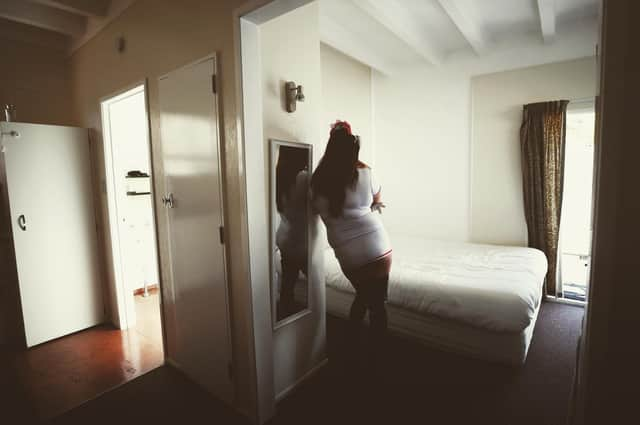Decriminalising prostitution: Experience of New Zealand woman stuck in sex trade for years belies country's so-called 'enlightened' policies – Dr Jacci Stoyle


To be honest, it irritated me at the time. I thought: “What nonsense! Of course, it makes a sound; sound exists, whether it is heard or not.”
So, it should come as no surprise that I feel similarly towards the full decriminalisation of prostitution. Renaming pimps as businessmen does not change their behaviour, no more than renaming prostitution as sex work will ever change it into a job that complies with any policy of fair-working conditions and health and safety legislation. So, like the sound in the forest, saying it is no longer a crime to exploit and abuse those who sell sex doesn’t stop its reality – violence exists whether you name it as a crime or not.
Advertisement
Hide AdAdvertisement
Hide AdWhilst the conundrum with the falling tree was a conceptual riddle, the full decriminalisation of prostitution is a dystopian nightmare which is having terrible consequences for those who sell sex in New Zealand. Recently, I was privileged to interview Chelsea Geddes, a prostitution survivor from New Zealand who spent 20 years in this so-called enlightened model of prostitution, which is said to be safer than the models where pimps and buyers are criminalised. Her lived experience tells a very different story.
Briefly, both sides of the prostitution debate agree that those who sell sexual services should not be criminalised. Abolitionists argue that prostitution is a form of violence against women, and as such, sellers should be treated as victims of crime and not as perpetrators. Buyers and pimps, however, should be criminalised to provide a deterrent for demand.
Those who call for decriminalisation of the whole sex trade argue that prostitution is a job like any other, that it is empowering for women and freely chosen, and therefore what crime is being committed? This idea is championed by Amnesty International, the iconic human rights organisation, who appear to have allowed their policy to have been influenced by Douglas Fox, a former member and founder of a major prostitution ring in the north of England, although they deny this.
After listening to Chelsea’s story, I would argue that the rhetoric of decriminalisation is the biggest gaslighting scam of the century. Let’s take some of these myths to task. The first illusion of decriminalisation states that prostitution is a choice. Chelsea’s ‘choice’, like that of so many others who find themselves involved in prostitution, belonged to Hobson. She grew up in an abusive home and was thrown out to fend for herself at 14. She was taken in by a paedophile and groomed accordingly. As Chelsea says, "Who else would take in a 14-year-old girl?” Was Chelsea’s so-called ‘choice’ of prostitution not inevitable?
The second mantra is that selling sexual services is a job. In New Zealand, the millionaire ‘businessmen’ who control the brothels do not give their employees the protections of the minimum wage, pension contributions, sick pay, holiday pay and maternity pay. Yet the sellers of sexual services are not entitled to be free agents as self-employed people are. Equally, there are no exiting services to support women who want to leave, after all, who needs an exiting service to leave a job? Sellers can remain utterly trapped in this way of life with absolutely no way out.
Thirdly, in full decriminalisation, prostitution is not a crime. Chelsea will tell you that in addition to your body, prostitution in New Zealand involves the sale of your human rights, such as the right to free expression, fair-working conditions and the right not to endure torture, rape, sexual harassment, and abuse. Simply put this means if a crime is committed in a brothel, the police are not interested.
When Chelsea was knocked unconscious and had her purse stolen in a brothel, she informed the police as soon as she could walk round to the station, supported by witnesses. The police would not even take a statement and told Chelsea to look in the public bin for her purse.
Ironically, as a policy, decriminalisation is usually sold to trade unions as a form of harm reduction, with the fourth myth that it reduces trafficking and that women are safer. Chelsea’s response to this supposition was simply: “Not at all. There is no deterrent, so buyers and pimps can do what they want.”
Advertisement
Hide AdAdvertisement
Hide AdAn example of this lauded ‘harm reduction’ is that condoms and needles are provided in brothels. However, Chelsea tells us this was always the case, but now it is far more problematic. Under New Zealand law, ostensibly to make prostitution ‘safer’, the non-use of condoms incurs a fine of $2,000 on both parties. Unsurprisingly, when the buyer removes the condom against the will of the seller, it isn’t reported. After all, as Chelsea says: “Why on Earth would you give yourself a $2,000 fine?” Oh my, what a clever little law this is; now the data can ‘prove’ just how much ‘safer’ prostitution is in New Zealand.
As we’ve heard, in New Zealand not only have one of the most traumatised groups of people been set aside and given different human rights to the rest of society but, even worse, the prevailing ethos denies this truth. Chelsea points out that this normalisation of casual and unpunishable violence is having a terrible effect on all women.
One in two women in New Zealand have experienced physical, sexual, or psychological intimate partner violence, which is the highest rate in the Organisation for Economic Co-operation and Development. Far from women being safer under this regime, they are more at risk of violence than ever.
The sound in the forest was not heard because humans were absent. The violence of prostitution in New Zealand is not heard because it has been legally silenced.
Dr Jacci Stoyle, secretariat for the Cross-Party Group for Commercial Sexual Exploitation